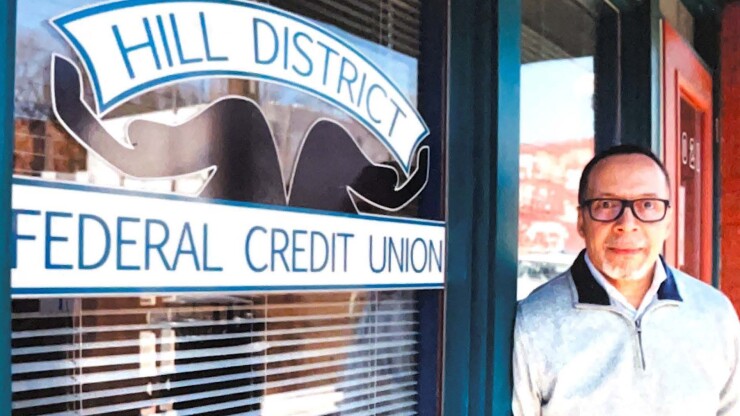
Credit unions pride themselves on helping those of modest means, but who helps when it is the credit union that is in need?
In one recent case it was a bank: F.N.B. Corp.
F.N.B., the holding company for First National Bank, said this week it is making a $1.1 million investment in the $13 million-asset Hill District Federal Credit Union. Both institutions are based in Pittsburgh.
F.N.B., which has $43.7 billion of assets, said the funds will enable the credit union to deliver financial services and resources to a historically underserved community. Hill District Federal Credit Union is the only African American-owned and operated financial institution in the Pittsburgh area.
In an interview, Hill District Federal Credit Union CEO Richard Witherspoon said external assistance from banks is essential to the credit union's mission of serving the underserved.
"The median income of those we serve is less than $20,000 per year, so we cannot generate sufficient income through traditional means such as interest on loans," he said. "Credit unions such as ours have low income and relatively high operating costs."
Hill District Federal Credit Union earned $26,000 in the first quarter of 2023, compared with about $3,000 a year earlier, according to call report data from the National Credit Union Administration.
And such tight margins often result in tiny credit unions seeking mergers.
The average asset size of a
Witherspoon said the primary reason small credit unions merge is due to their inability to maintain the minimal capital requirements required by regulators. When assistance is given via a capitalization deposit or a grant from larger institutions, that gives a smaller credit union more stability. "And it appeases the regulators," he said.
The company is injecting a total of more than $200 million in loans, investments and grants to foster revitalization in Pittsburgh's Hill District, which is the site of its
"Our partnership reflects FNB's commitment to connect underserved members of our communities with knowledge and banking resources, including products, services and credit, that contribute to financial stability and success.," F.N.B. Chairman and CEO Vincent Delie Jr. said in a press release Monday.
The latest investment also includes a $1 million equity equivalent to expand the capacity of the credit union's Business Line of Credit Program, which provides financing to small businesses in the Hill District.
Vincent Hui, managing director at Cornerstone Advisors, said in an interview that the partnership is "very intriguing" as banks and credit unions don't often collaborate.
Such assistance is a nice option for small credit unions, but it is unclear how many banks would do it since they are essentially supporting a competitor, he said.
"I would think that deals like this would be in areas that a bank would not serve and this is an opportunity to support communities either for [Community Reinvestment Act] purposes or part of the [environmental, social and governance] efforts," Hui said. "I don't see the profit opportunity for banks in partnerships like this."
An F.N.B. spokesperson said the investment in HDFCU does qualifies for CRA credit and added that the bank has an "outstanding" CRA rating, so its latest commitment exceeds its CRA requirements.
Witherspoon said that because the credit union serves a market that traditional financial institutions don't usually attract, it does not need to compete with banks such as F.N.B.
"But we do need to garner resources to serve, educate and provide opportunities for our members to have access to financial products that are desperately needed," Witherspoon said.
F.N.B. is also contributing $100,000 for a physical expansion project that will increase the size of the credit union's only office.
The credit union, which was chartered in 1970, owns the building, according to Witherspoon. The renovation will add four apartments and will double the operating space of the credit union to include a classroom for financial literacy classes and a mortgage department.
Such partnerships between banks and credit unions are rare, but this is not the first time F.N.B. has stepped in to help Hill District FCU. In 2017, the bank contributed $165,000 to boost deposits and help the credit union update its computer system.
F.N.B.'s relocation of its own headquarters is expected to bring nearly $1 billion in economic expansion to the Pittsburgh region and create thousands of jobs, the bank said.






